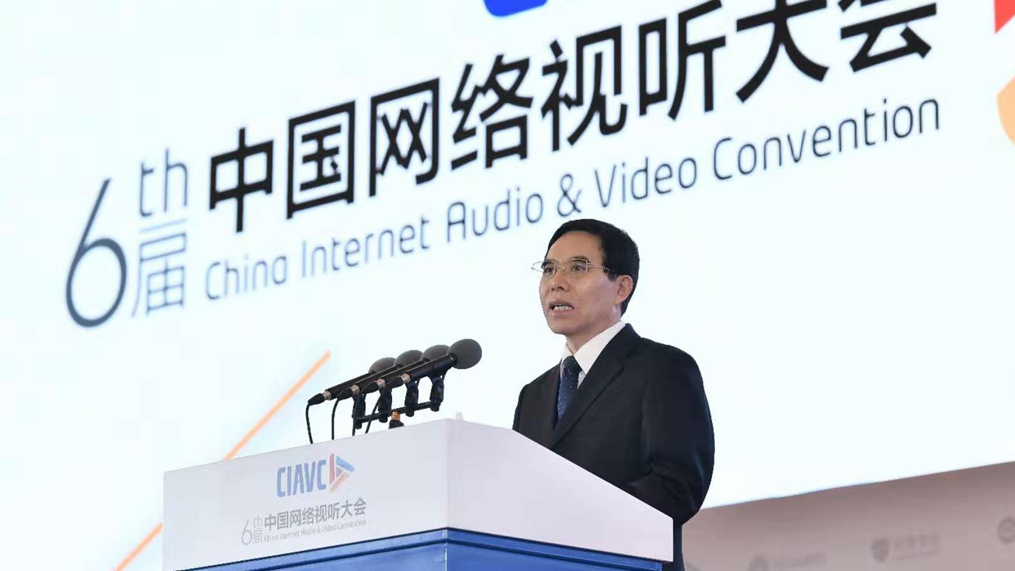
Technology
18:13, 01-Dec-2018
Innovation to continue in China’s Internet audio/video industry
Updated
17:51, 04-Dec-2018
By Wei Lynn Tang
02:25

China's Internet audio and video industry has grown by leaps and bounds, officials have said, urging the industry to keep up with the innovation drive.
Data from the China Netcasting Services Association (CNSA) showed the country had 609 million online video users by the end of June 2018, 5.2 percent up from the same period last year. They accounted for 76 percent of China's total online users and represented a cumulative increase of 74.5 percent in five years.

The 6th China Internet Audio & Video Convention was held in Chengdu, SW China's Sichuan Province, from November 28 to December 1, 2018. /CGTN Photo
The 6th China Internet Audio & Video Convention was held in Chengdu, SW China's Sichuan Province, from November 28 to December 1, 2018. /CGTN Photo
Nie Chenxi, minister of the State Administration of Radio and Television, said the country should strive to be a pioneer of new formats and services.
"We should strengthen our independent innovation [in the online audio-visual field], push forward the breakthrough of core technology, and accelerate our independent property rights," he said.
Nie, speaking at the opening ceremony of the 6th China Internet Audio & Video Convention, held in Chengdu, southwestern Sichuan Province, also said the country encourages and supports service innovation, technological innovation and integrated innovation.
"Competition within the Internet audio-visual industry is becoming more intense; we need to build differentiated and high-quality services to win audiences."

Nie Chenxi, head of China's State Administration of Radio and Television speaks at the opening ceremony of the 6th China Internet Audio & Video Convention in Chengdu, southwest China's Sichuan Province. /CIAVC Photo
Nie Chenxi, head of China's State Administration of Radio and Television speaks at the opening ceremony of the 6th China Internet Audio & Video Convention in Chengdu, southwest China's Sichuan Province. /CIAVC Photo
Nie said China's online video market is valued at 100 billion yuan (about 14.4 billion US dollars), with that of online video advertising hitting nearly 50 billion yuan.
Meanwhile, revenue from online audio-visual program services has reached 14.3 billion yuan, he noted, with the industry seeing the emergence of a number of leading enterprises.
Chinese audio-visual firms 'going out'
In the first three quarters of 2018, five Chinese companies within the Internet audio-visual field were listed – four in New York and one in Hong Kong. They include Bilibili, a video sharing site, and iQiyi, dubbed the Netflix of China.
Zhou Jie, the deputy secretary-general of CNSA, said it's an inevitable trend for Chinese companies to go global, adding that the best way to do so is via a cultural push.
"Some of China's excellent products have been promoted outwards through foreign channels. As some of our companies list abroad, it also gives a chance for foreign audience to follow Chinese content," he said.
"For example, the Chinese detective drama series 'Day and Night' has been acquired by Netflix."

Zhou Jie, deputy secretary-general of CNSA says experts are most bullish on short videos with the highest growth potential going forward. /CGTN Photo
Zhou Jie, deputy secretary-general of CNSA says experts are most bullish on short videos with the highest growth potential going forward. /CGTN Photo
Zhou cited short videos, paid knowledge and content, as well as micro-entertainment as platforms with the biggest room for development and highest business opportunities going forward.
Research from CNSA shows that China's video content industry is expected to reach almost 202 billion yuan in 2018, a year-on-year increase of 39.1 percent.
This is driven by a diversification in user entertainment methods, an improvement in user experience, an increase in active users and user usage time, which resulted in an uptick in average revenue per user.
China's video content industry will continue to grow at a high speed in the future, according to the association.

SITEMAP
Copyright © 2018 CGTN. Beijing ICP prepared NO.16065310-3
Copyright © 2018 CGTN. Beijing ICP prepared NO.16065310-3